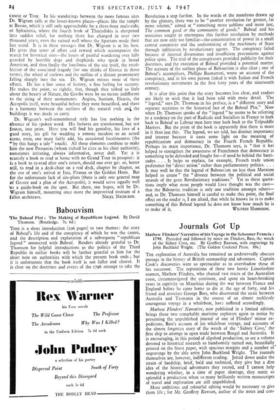Babouvism
'The Babeuf Plot : The Making of Republican Legend. By David Thomson. (Routledge. 7s. 6d.)
THIS is a short introduction (to6 pages) to two themes: the story of Babeuf's life and of the conspiracy of which he was the centre, and the description and explanation of a subsequent " republican legend " connected with Babeuf. Readers already grateful to Dr. Thomson for helpful introductions to the politics of the Third Republic in earlier books will be further grateful to him for the short note on authorities with which the present book ends ; but it is unfortunate that the book itself is not fuller and clearer. It is clear on the doctrines and events of the 1796 attempt to take the
Revolution a step further. In the words of the manifesto drawn up by the plotters, there was to be "another revolution far greater, far more solemn," aimed at " something more sublime and more just, The common good or the community of goods." Babeuf and his associates sought to encompass this further revolution by methods that are now only too familiar—the concentration of power in a small central committee and the undermining of the machinery of State • through infiltration by revolutionary agents. The conspiracy failed because of internal dissensions and insufficient precautions against police spies. The trial of the conspirators provided publicity for their doctrines, and the execution of Babeuf provided a potential martyr. The account of the earliest phase of Babouvism is also clear ; one of Babeuf's accomplices, Phillipe Buonarroti, wrote an account of the conspiracy, and in his own person linked it with Italian and French revolutionary movements in the first forty years of the nineteenth century.
It is after this point that the story becomes less clear, and readers are likely to wish that it had been told with more detail. The " legend," says Dr. Thomson in his preface, is a " different story and separate accretion to the historical fact of the Babeuf Plot." Now when Dr. Thomson speaks of the " legend " he seems to be referring to a tendency on the part of Radicals and Socialists in France to hark back to Babeuf as Labour men here may hark back to the Tolpuddle Martyrs. But the point of the book is apparently that there is more in it than just this. The legend, we are told, has distinct importance and interest because it casts some light on the meaning of republicanism and democracy in the Fourth French Republic. Perhaps its main importance, Dr. Thomson says, is " that it has helped to strengthen the awareness of Frenchmen that democracy is something to be defended and fought for—if need be behind the barri- cades. . . . It helps to explain, for example, French trade union preference for `direct action' rather than parliamentary politics. . . . It may well be that the legend of Babouvism no less than Marxism helped to create " the " divorce between the political and social strands of the great Revolutionary traditions." Yet as these quota- tions imply what most people would have thought was the case— that the Babouvist tradition is only one tradition amongst others— and, as Dr. Thomson himself is careful to make this point, the final effect on the reader is, I am afraid, that while he knows he is to make . something of this Babeuf legend he does not know how much he is






































 Previous page
Previous page